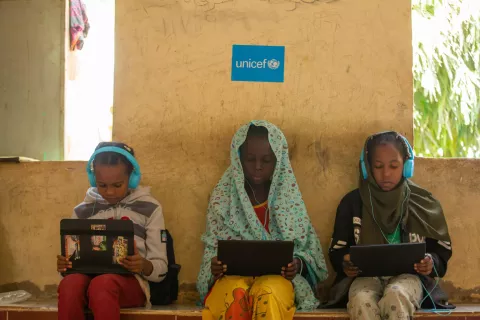12 weeks into the conflict, ‘deeply troubling’ situation for children in Tigray
Statement by UNICEF Executive Director Henrietta Fore on the humanitarian situation in Tigray, Ethiopia

NEW YORK, 27 January 2021 – “The very little we know about the impact of the conflict on children in Tigray – from limited partner accounts and UN assessments – is deeply troubling.
“Across Tigray, immunizations have ground to a halt. Civilian infrastructure, including health facilities, has been damaged or destroyed, and essential supplies looted. There is little fuel to operate water and sanitation systems. Children in most of Ethiopia have returned to school following COVID-19 restrictions – but not the 1.3 million school-aged children in Tigray. There are reports of 300 unaccompanied or separated children among the refugees who fled to Sudan, and potentially many more among the thousands of internally displaced persons.
“One assessment conducted by partners in early January in the Shire area showed rates of severe acute malnutrition of up to 10 per cent among children below the age of five. This is far above WHO’s emergency threshold of 3 per cent and could potentially put the lives of up to 70,000 children at risk. The global acute malnutrition level was up to 34 per cent – raising fears that affected children could eventually fall into life-threatening malnutrition.
“Because of access restrictions, our knowledge of the situation is still very limited. Our concern is that what we don’t know could be even more disturbing. For 12 weeks, the international humanitarian community has had very limited access to conflict-affected populations across most of Tigray. The small but crucial opening that enabled UNICEF and partners to dispatch 29 trucks filled with emergency nutrition, health, and child protection supplies was a step in the right direction, but nowhere near the level of access and scale of support that is actually needed.
“Beyond delivering supplies, restoring essential services is key. For that to happen, salaries of civil servants need to be paid and access for humanitarian staff granted to help regional authorities assess the growing needs, identify priorities and deliver much-needed services.
“All parties to the conflict have a fundamental obligation to enable rapid, unimpeded and sustained access to civilians in need of assistance. Humanitarian actors require unconditional, blanket authorizations to bring in personnel and goods.
“The one thing we do know is that every additional day of waiting for help will only worsen children’s suffering.”
#####




